Search
Did you mean: Thera?
Search Results
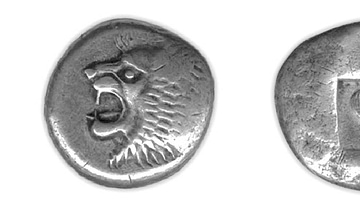
Article
Colchis & Iberia in Antiquity
Colchis (western Georgia) and Kartli/Iberia (eastern and southern Georgia) were important regions in the Caucasus area of Eurasia from the Bronze Age of the 15th century BCE. Prospering through agriculture and trade, the region attracted...
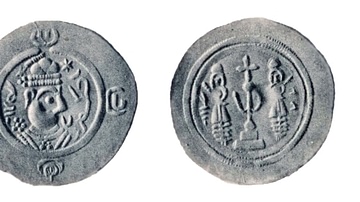
Image
Kartli/Iberia Coin of Prince Stephanos I
Kartli/Iberia coin of Prince Stephanos I, first emission. Silver. Weight – 2,9 gr. d=28mm. Obverse: Ohrmazd IV to the right. Legend in Pehlevi: hrm – aphzu (Ohrmazd Augustus). This is placed within onefold circle of the dots. Four Georgian...

Image
Verrco Sculpture from Ancient Iberia
This verraco of a pig is made of granite and dates from the 3rd-1st century BCE. It was created by members of the Vettonian culture of ancient Iberia and was found in the Spanish province of Ávila. Verracos were sculptures of male beasts...
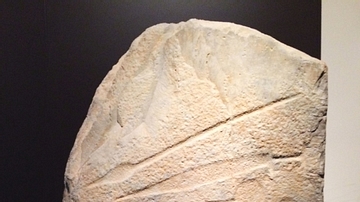
Image
Warrior Stela from Bronze Age Iberia
This stela is from Solana de Cabañas (Cabañas del Castillo, Cáceres), Spain and dates from the Late Bronze Age. It is made of slate, and it was unearthed in the late 19th century CE. This was the first specimen to be discovered in a series...
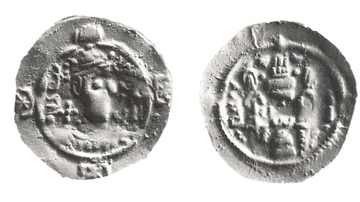
Image
Kartli/Iberia Coin of Ohrmazd IV
Silver. The weights range from 2,92 gr. to 3,83 gr. d=30-31/34 mm. Obverse: Ohrmazd IV to the right. Legend in Pehlevi: hrm – aphzu (Ohrmazd Augustus), in front of the figure. Cross behind the figure. This is placed within onefold circle...
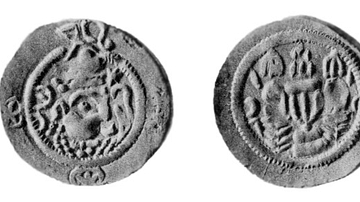
Image
Kartli/Iberia. Prince Juansher’s Drachm
Silver. Weight – 2,73 gr. d=24/25 mm. Obverse: Ohrmazd IV to the right. Legend in Pehlevi: hrm – aphzu (Ohrmazd Augustus). This is placed within onefold circle of the dots. Above two Asomtavruli letters ႿႭ for the name Jonber//Juansher...
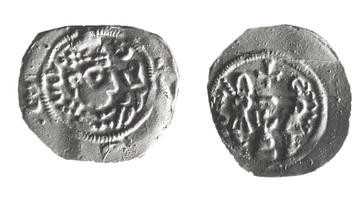
Image
Kartli/Iberia Coins with a Cross & Altar
Silver. The weights range from 2,44 gr. to 3,23 gr. d= 26/27-29/30 mm. Obverse: Ohrmazd IV to the right. Legend in Pehlevi: hrm – aphzu (Ohrmazd Augustus). This is placed within onefold circle of the dots. Reverse: Cross on altar...
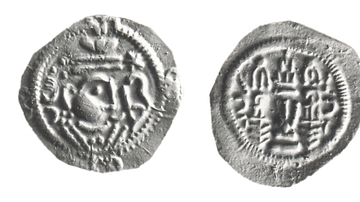
Image
Kartli/Iberia. Prince Gurgen’s Drachms
Silver. The weights range from 2,70gr. to 2,98 gr. d=26/28-28/31mm. Obverse: Ohrmazd IV to the right. Legend in Pehlevi: hrm – aphzu (Ohrmazd Augustus). This is placed within onefold circle of the dots. Above two Asomtavruli letters...

Image
Stela of Hernán Pérez VI from Bronze Age Iberia
This granite stela dates from the Early or Middle Bronze Age. It was discovered in Cáceres, Spain. (Museo Arqueológico Nacional, Madrid)
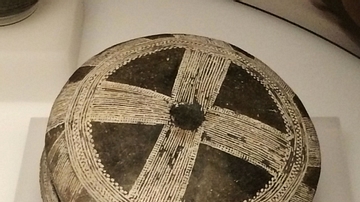
Image
Early Bronze Age Bell Beakers from Iberia
These clay bell beakers come from the Early Bronze Age necropolis of Ciempozuelos (Cuesta de la Reina, Madrid), Spain and they were found during excavations conducted in the late 19th century CE. (Ciempozuelos was the first Bell-Beaker necropolis...